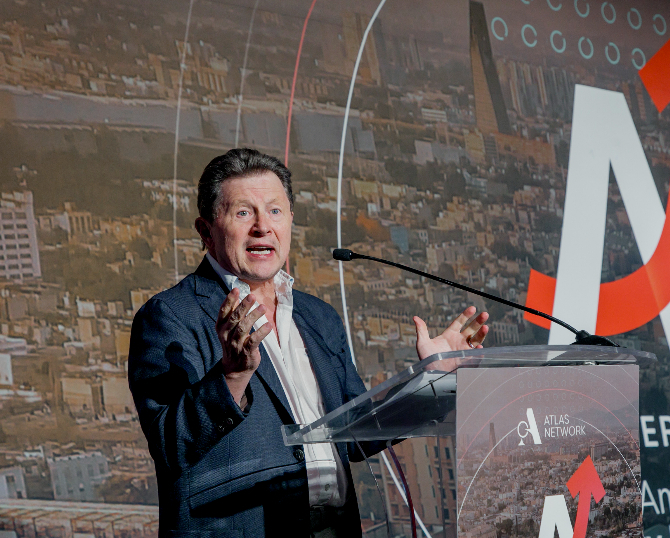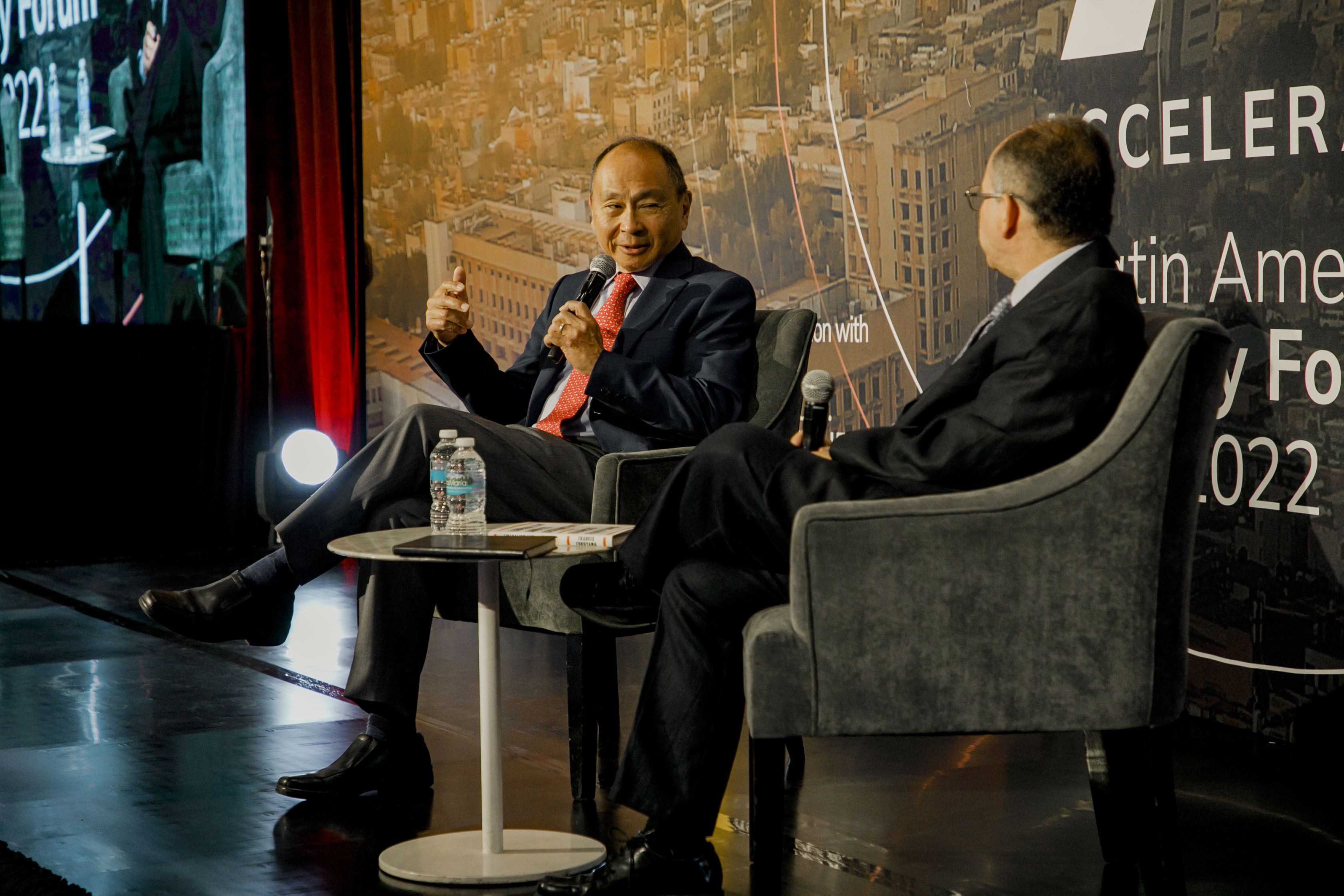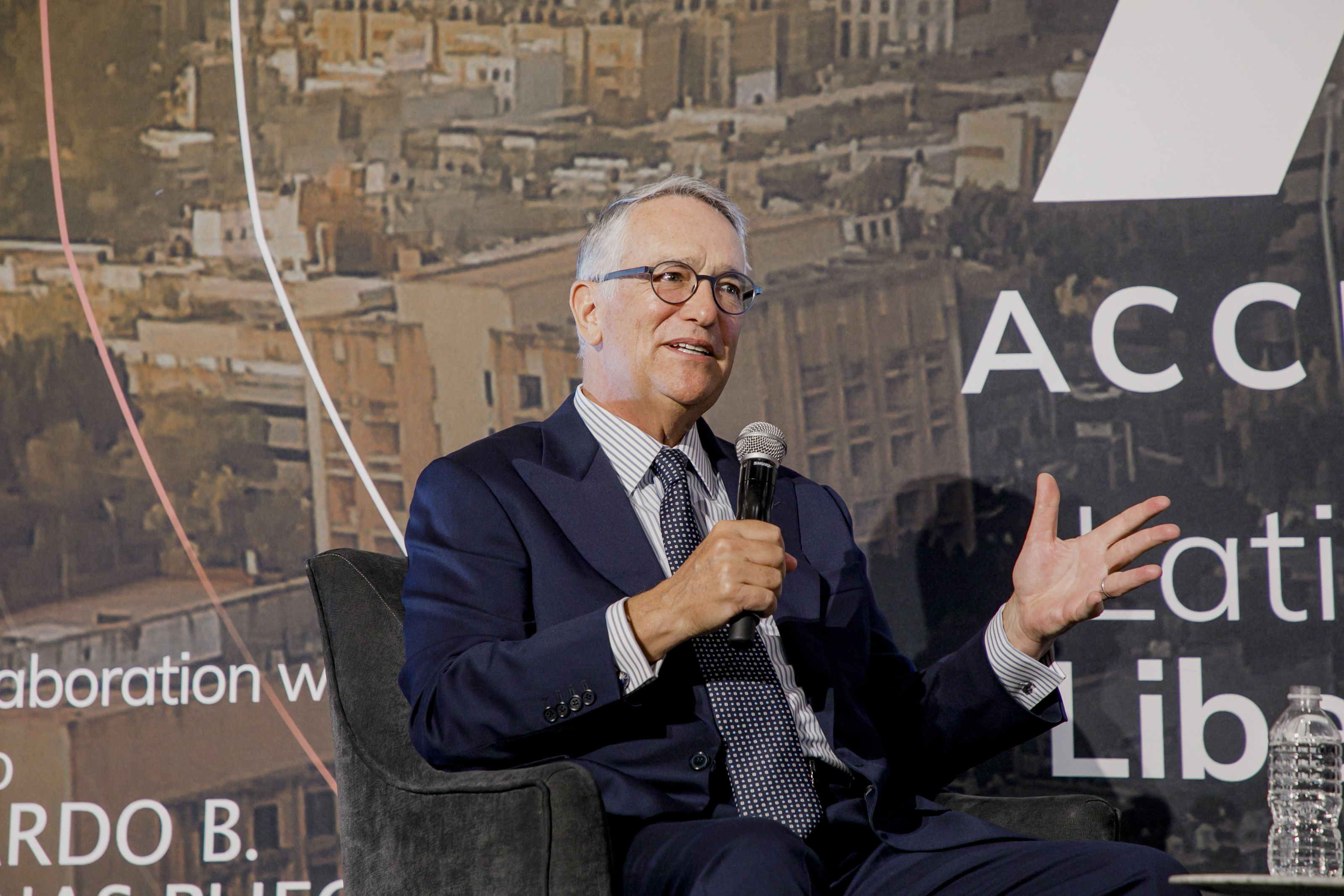
On June 9–10, a record-breaking 323 individuals from 24 countries gathered in Mexico City for Atlas Network’s Latin America Liberty Forum 2022, co-hosted by Centro Ricardo B. Salinas Pliego. As illiberal forces on the political left and right gain traction across the region, the event focused on how Atlas Network partners can effectively push back against the statist tide. That means both winning in the market of ideas and creating real progress toward ending poverty. From big-picture perspectives on Latin America as a whole to focused discussions on the challenges facing individual countries, experts gave their thoughts on how organizations can accelerate the region toward a better, freer future.
Day 1:
Latin America Liberty Forum 2022 opened with a welcome from Brad Lips (CEO, Atlas Network, United States) followed by remarks from Ana Lilia Moreno (México Evalúa, Mexico). This was followed by an address from Dr. Francis Fukuyama (Stanford University, United States) on “Liberalism and Its Global Challenges.” This address prepped the audience for the Cornerstone Talks given by five different speakers who grounded the conference in the specific themes and topics to be focused on over the next two days. Roberto Salinas León (Center for Latin America) moderated the discussion. Antonella Marty (Center for Latin America) began the conversations followed by José Benegas (lawyer and journalist, Argentina) on “Accelerating Liberty in Latin America.” Ignacio Munyo (CERES, Uruguay) spoke on “Macro Perspectives in Latin America.” Berta Valle (human rights activist, Nicaragua) explained her perspective on human rights and Martin Krause (Centro de Investigaciones de Instituciones y Mercados de Argentina, Argentina) closed the session speaking on “A Market of Ideas.”

Concurrent sessions began, after a brief morning break, on the topic of human progress in Latin America and around the world. The speakers contributing to this session were Marian Tupy (Cato Institute, United States), Agustín Etchebarne (Fundación Libertad y Progreso, Argentina), and Arturo Damm Arnal (Universidad Panamericana, Mexico). This discussion was moderated by Esteban González (Certell, United States). Together they shared various stories that illustrate the speed at which society is advancing towards a more prosperous world. The second concurrent session was titled “Development and Dignity,” and the speakers outlined new research and strategic initiatives to show the emerging dignity-first approach to economic development. Hane Crevelari (Atlas Network, United States) moderated the discussion for the second session. The speakers were Elena Panaritis (Thought4Action, Greece), José Ignacio Beteta, (Asociación de Contribuyentes del Perú, Peru), and Magno Karl (Associação Livres, Brazil).
During lunch, Martín Aguirre (editor of Mirada Sur) interviewed Sergio Sarmiento (Caminos de la Libertad, Mexico). They discussed the challenges facing the ideas of liberty in the Latin American region. Following this conversation, three speakers discussed the challenges and struggles facing prosperity in Latin America. The talk was moderated by Rómulo López and speakers were Ian Vásquez (Cato Institute, United States), Hernán Bonilla (chief of staff, Ministry of Economy, Uruguay), and Valeria Moy (Instituto Mexicano para la Competitividad, Mexico). Session three was moderated by Paulo Costa Fuchs (Tapa de Mão Invisível Podcast, Brazil). Speakers Guillermo Peña Panting (Eléutera, Honduras), Monika Melo (Instituto OMG, Dominican Republic), and Sergio Chaverri (CEO at Sweat Capital Futures, Costa Rica) spoke on the facts, fallacies, and issues surrounding blockchain technology and Bitcoin.
The session that followed was an all-female panel discussing female empowerment as a goal of the liberty movement. Antonella Marty moderated the discussion featuring Bertha Pantoja (Caminos de la Libertad, Mexico), Dora de Ampuero (Instituto Ecuatoriano de Economía Política, Ecuador), Jennifer Grossman (Sociedad Atlas, Latin America), and Roxana Nicula (FUNDALIB, Spain). The evening sessions began with experts from Argentina, Chile, and Uruguay to discuss social mobility in Latin America. Gonzalo Schwarz (Center for Latin America) moderated the discussion between María Paz Arzola (Libertad y Desarrollo, Chile), Agustín Iturralde (CED, Uruguay), and Diego Piccardo (Libertad y Progreso, Argentina). They outlined that income inequality is not the main problem of our times, but rather, it is the lack of upward social mobility. This was followed by a discussion on the challenges that arise for liberty in the age of misinformation, conspiracy theories, and the amount of information that we receive digitally. Gabriela Calderón (El Cato, Ecuador) moderated the discussion, while Marcel Granier (CEDICE Libertad, Venezuela), José Ignacio Beteta (Asociación de Contribuyentes del Perú, Peru), and Ivabelle Arroyo (Director, El Andén, Mexico) discussed these issues.
The evening capped off with the 2022 Latin America Liberty Award Dinner. Antonella Marty stood as the master of ceremonies for the evening, starting with opening remarks from Brad Lips as he spoke on liberalism and the free society. The keynote address during dinner was given by Ricardo Salinas Pliego (president, Grupo Salinas, Mexico) in the form of an interview. The finalists for the award were IDEAS Lab (Costa Rica) and Livres (Brazil) for their work to expand individual freedom. Livres was chosen as the winner for the US$10,000 award for their efforts to reform the regulatory structure in Brazil to make private investment more accessible for water and sanitation services.

Day 2:
The second day of the conference began with a breakfast conversation between Dr. Tom Palmer (Atlas Network, United States) and Carlos Newland (Universidad Católica Argentina, Argentina). They spoke about how to measure appreciation of market principles and to use such knowledge to guide reform efforts.
After breakfast, the first breakout session for the day began. Frank Zimmerman (Federalismo y Libertad, Argentina) moderated a discussion between Dr. Carlos E. Diaz-Rosillo (Adam Smith Center for Economic Freedom, United States), Gloria Alvarez (independent author and speaker, Guatemala), Rocio Guijarro (CEDICE Libertad, Venezuela), and Carlos Luna (contemporary artist, United States). They spoke about how Venezuela, Cuba, and Nicaragua are struggling under tyrannical political systems and are lacking freedoms the citizens naturally have a right to. These experts shared the tales of their struggles as they work to bring back liberty to the region. Session eight began with Sary Levy-Carciente (CEDICE Libertad, Venezuela) moderating a conversation between María José Bernal (Fenalco Antioquia, Colombia), Manuel Molano (Economist, Mexico), Luis Loría (IDEASLabs, Costa Rica), and Lucas Berlanza (Instituto Liberal, Brazil). These experts explained that government regulations in all areas of economic activity can lead to confusing and burdensome business situations and create the danger of empowering bureaucrats with the power to dictate daily life.
Before lunch, there were two more concurrent sessions beginning with a conversation on Brazil’s liberty movement. The Brazilian experts discussed the increase in liberty throughout the past couple years and the future they are continuing to work towards. Contributing speakers were Milla Maia (Instituto Millenium, Brazil), Dr. Adriano Paraibana (Instituto Mises, Brazil), Nycollas Liberato (Students for Liberty, Brazil), with the conversation moderated by Hane Crevelari. While this session was occurring, there was a different option offered. The simultaneous session was on innovative ideas to promote liberty and sound policy in Latin America. The conversation was hosted by Lorenzo Montanari (Property Rights Alliance, United States). The speakers were Bettina Horst (Fundación Libertad y Desarrollo, Chile), María Clara Escobar (Fundación Instituto de Ciencia Política Hernán Echavarría Olózaga, Colombia), and Mariana Campos (México Evalúa, Mexico).
The Think Tank Shark Tank lunch began with a pitch from Valeria Peralta Albanez (Fundación Salvadoreña para el Desarrollo Económico y Social, El Salvador) who posed the “Citizenship Academy.” This is a 12-hour course she has designed to educate and train low-income El Salvadoran students on civics and the value of democratic governance. Albanez was followed by Jesús Armas (Ciudadanía Sin Límites, Venezuela) who proposed his project to oppose the Venezuelan dictator Maduro and his party against moving the country towards a Soviet-inspired model of government. He plans to build a network of organizations designed to reject this government model aiming to reach government leaders and various civil society organizations. The final contestant, Edwin Zarco Nieva (Centro de Investigación, Peru), pitched his project, which is a training program aimed to prepare enterprising individuals to take their ideas to market. He wants to advance free-market conservation efforts and inspire entrepreneurship with this project. After much discussion, the judges decided to award the US$10,000 prize to Nieva.
After the luncheon, the conference capped off with three last sessions. Cody Marx Bailey (private investor, United States and Mexico) moderated a conversation between Armando Régil (IPEA, Mexico) and Luis Loría (IDEASLabs, Costa Rica). They discussed the role of technology and innovation in the liberty movement. Session 12 featured Dean Ball (Manhattan Institute, United States) who moderated a conversation on police reform in Latin America. José Miguel Aldunate Huidobro (Observatorio Judicial, Chile), Magno Karl (Associação Livres, Brasil), and Gerardo Bongiovanni (Fundación Libertad, Argentina) discussed the failure of the police in many Latin American countries and the need to revive faith and trust in law enforcement officers. The final session was a presentation by Terry Kibbe (Free the People, United States) and Carlos and Claudia Luna (contemporary artist, United States) on Carlo’s book, A Free Life, that tells the story of his journey to finding liberty. The session summarized the conference well, leaving everyone with a clear understanding and reminder of the purpose of the liberty movement: to affect every person’s life for the better with improved freedoms and rights.
For more highlights from the 2022 Latin America Liberty Forum check out our social media feeds, and make sure to join us at the 2022 Liberty Forum & Freedom Dinner on November 16–17!